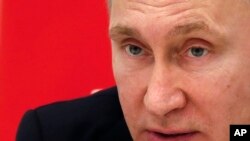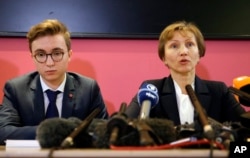Russian officials have angrily rejected the findings of a British public inquiry into the 2006 murder of former Russian intelligence officer Alexander Litvinenko in London. The investigation concluded that President Vladimir Putin "probably" approved the dissident former agent's poisoning with radioactive polonium-210.
Some Kremlin opponents, however, welcome the probe's conclusions and say Litvinenko's murder was just one in a series of hits targeting Kremlin opponents.
The investigation, whose results were released Thursday, found that the Federal Security Service (FSB), Russia's main security agency, was directly responsible for killing Litvinenko. The man who headed the inquiry, British judge Robert Owen, said he had also concluded that "the FSB operation to eliminate Mr. Litvinenko" was probably approved by then FSB director Nikolai Patrushev, as well as President Vladimir Putin.
On Monday, shortly before the results of the probe were released, Putin's press secretary Dmitry Peskov told journalists in Moscow that the Kremlin was not interested in what the British investigators had found.
"It is not now in the sphere of ... topics that are of interest to us," Peskov said.
'Pseudo process'
But after international media quoted British investigators referring to Vladimir Putin's possible involvement in Litvinenko's murder, Russian Foreign Ministry spokeswoman Maria Zakharova told journalists in Moscow that the probe was "poetically motivated."
"We didn't see anything new in the results [of the investigation]," she said. "It is all the logical result of a pseudo-judicial process played out by the British tribunal and authorities that is ... putting it mildly, contradictory, and in fact can be called criminal."
Russia's investigative committee - an investigative body like the FBI - similarly called the British probe a "pseudo process," saying it was "devoid of an adversarial process from the start" and accusing the British investigators of "assigning" the role of the guilty party in advance and then using "certain so-called secret 'evidence'" to reach their conclusion.
Andrei Lugovoi and Dmitry Kovtun, the two Russians accused of spiking Litvinenko's tea with polonium-210 when they met with him at a London hotel, also reacted Thursday to the announcement of the probe's results.
Lugovoi, who was elected to the State Duma, the lower house of Russia's parliament, in 2007, called the investigation biased.
"The charges against me are absurd," he told the Interfax news agency. "As we expected, nothing sensational has happened! The results of the investigation announced today once again confirm the anti-Russian position of London, the narrow-mindedness and unwillingness of the British to establish the true cause of Litvinenko's death."
Kovtun, a businessman, also once again denied involvement in Litvinenko's death, and said the British probe used "forged, fabricated evidence."
String of deaths
Opposition activist Vladimir Kara-Murza, Jr. told VOA he welcomed the conclusions of the British probe.
"We have, for the first time, not a statement by a non-governmental organization, or someone's opinion, but the official verdict of a British judge, which states in black and white that the [Russian] head of state and head of the state security services probably personally approved a political assassination - and, in a terrifying way, with the use of radioactive substances - in the capital of another nation," Kara-Murza said, noting that Litvinenko was a British citizen at the time of his death.
"For the first time, we have a legal opinion indicating the likely involvement of Mr. Putin and Mr. Patrushev, representatives of the top leadership of today's Russian state, in political assassinations," he said.
Kara-Murza is a coordinator for the Open Russia movement established by Mikhail Khodorkovsky, the Russian former oil tycoon who became a Putin opponent and spent more than a decade in prison in Russia.
He suffered a sudden, near-fatal illness last May, and while the exact nature of his illness has not been established, Kara-Murza believes he was the target of a deliberate poisoning attempt because of his opposition activities. He said there is an obvious trend, citing the murder of opposition leader Boris Nemtsov in Moscow last February, and the case of Yuri Shchekochikhin, the veteran investigative journalist and liberal lawmaker who died of a mysterious disease in 2003.
"It can be said without a doubt that over the last several years there has been a very high mortality rate among opponents of Vladimir Putin," he said. "It is obvious in what happened to Boris Nemtsov, shot four times in the back on the Bolshoi Moskvoretsky Bridge, and in those cases that are not fully understood - for example, the story of Yuri Shchekochikhin: as far as I know, his friends and colleagues at Novaya Gazeta [newspaper] do not doubt for a minute that it was a deliberate poisoning. And what happened to me: I am absolutely convinced that it was a deliberate poisoning, that it was attempted murder."
Kara-Murza recently asked Russia's Investigative Committee to look into his case.

